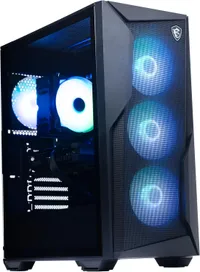The best gaming PCs in 2026
Here are the best gaming PCs for every budget, based on our reviews
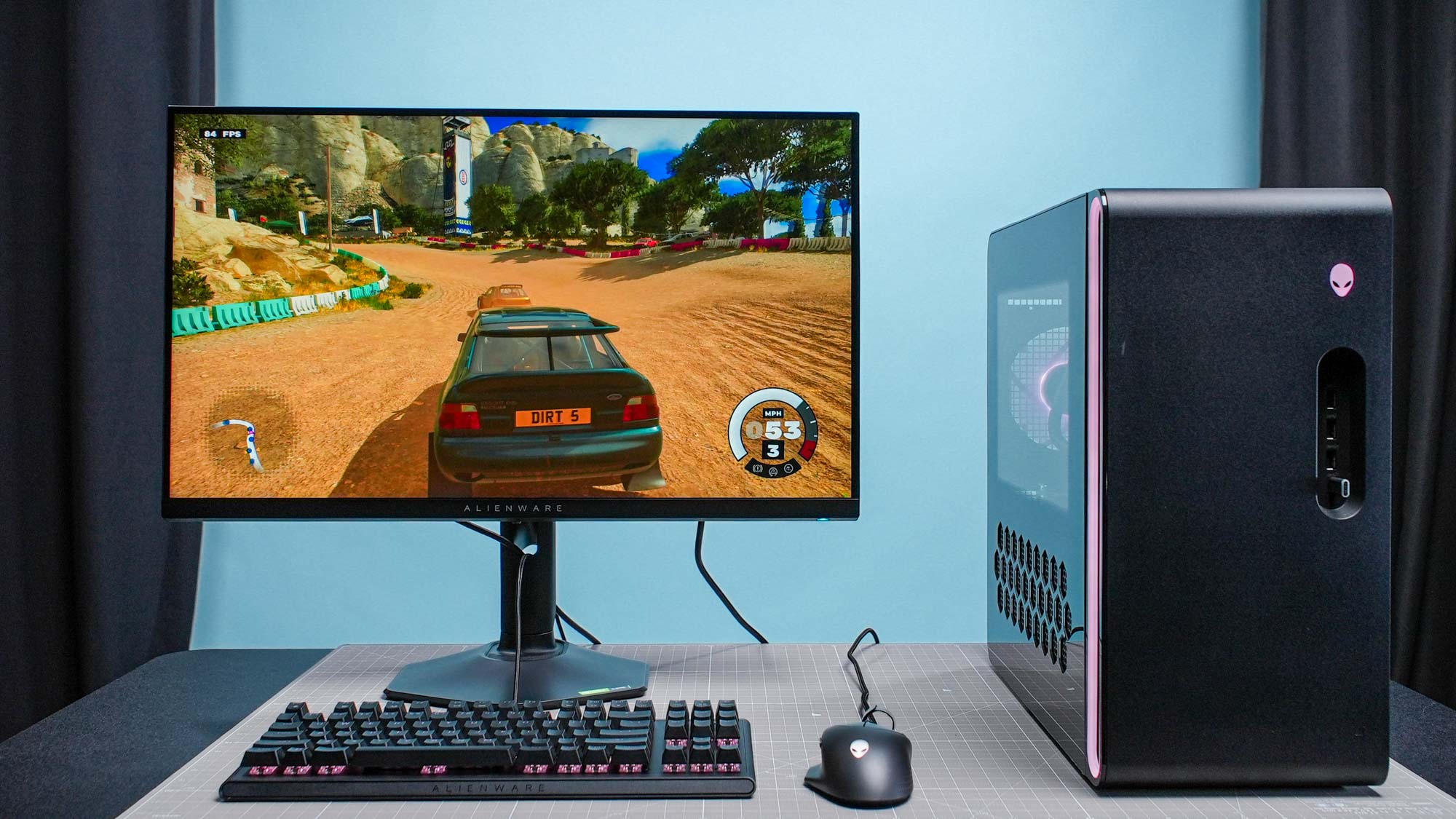
Here at Tom’s Guide our expert editors are committed to bringing you the best news, reviews and guides to help you stay informed and ahead of the curve!
You are now subscribed
Your newsletter sign-up was successful
Want to add more newsletters?

Daily (Mon-Sun)
Tom's Guide Daily
Sign up to get the latest updates on all of your favorite content! From cutting-edge tech news and the hottest streaming buzz to unbeatable deals on the best products and in-depth reviews, we’ve got you covered.

Weekly on Thursday
Tom's AI Guide
Be AI savvy with your weekly newsletter summing up all the biggest AI news you need to know. Plus, analysis from our AI editor and tips on how to use the latest AI tools!

Weekly on Friday
Tom's iGuide
Unlock the vast world of Apple news straight to your inbox. With coverage on everything from exciting product launches to essential software updates, this is your go-to source for the latest updates on all the best Apple content.

Weekly on Monday
Tom's Streaming Guide
Our weekly newsletter is expertly crafted to immerse you in the world of streaming. Stay updated on the latest releases and our top recommendations across your favorite streaming platforms.
Join the club
Get full access to premium articles, exclusive features and a growing list of member rewards.
The best gaming PCs are the ones you can afford that have enough power to run the games you want to play. We test and review dozens every year, and though they can quickly get very expensive if you shop for the best of the best, there are great gaming PCs in a variety of sizes and prices.
Currently, our top recommendation for most people is the Alienware Aurora R16, which offers exceptional performance in a relatively small and attractive tower. We also recommend the more subtle Dell Tower Plus for those looking for a gaming PC under $1,000 and the RTX 5090-powered Alienware Area-51 if money is no object.
We test all new gaming PCs (in both our testing lab and our homes) to ensure they meet our standards, and we regularly update this page as systems become available. With new gaming PCs from the likes of Alienware, HP, Acer, and others, we're sure to add a plethora of great machines to suit your gaming needs.
Read on, and we'll help you find your next gaming PC.
The best gaming PCs you can buy right now
Why you can trust Tom's Guide
Here are the best gaming PCs you can buy right now based on our testing and reviews.
The best gaming PC overall
Specifications
Reasons to buy
Reasons to avoid
The Alienware Aurora R16 delivers solid gaming performance in an unassuming chassis.
This model has been designed to run cooler and quieter than its predecessors, which our in-house testing bears out. It's also smaller than before, which makes it easier to set up on your work desk. Unfortunately, some of the internal design choices make it harder than necessary to upgrade components. That said, this ensures everything is well-organized.
Starting at $1,599, this beastly gaming machine is relatively affordable — especially for newcomers to the world of PC gaming. Of course, upgrades will bump up the price, so keep that in mind.
Make sure you check our Dell coupons page to find the latest discounts.
Read our full Alienware Aurora R16 review.
The best budget gaming PC
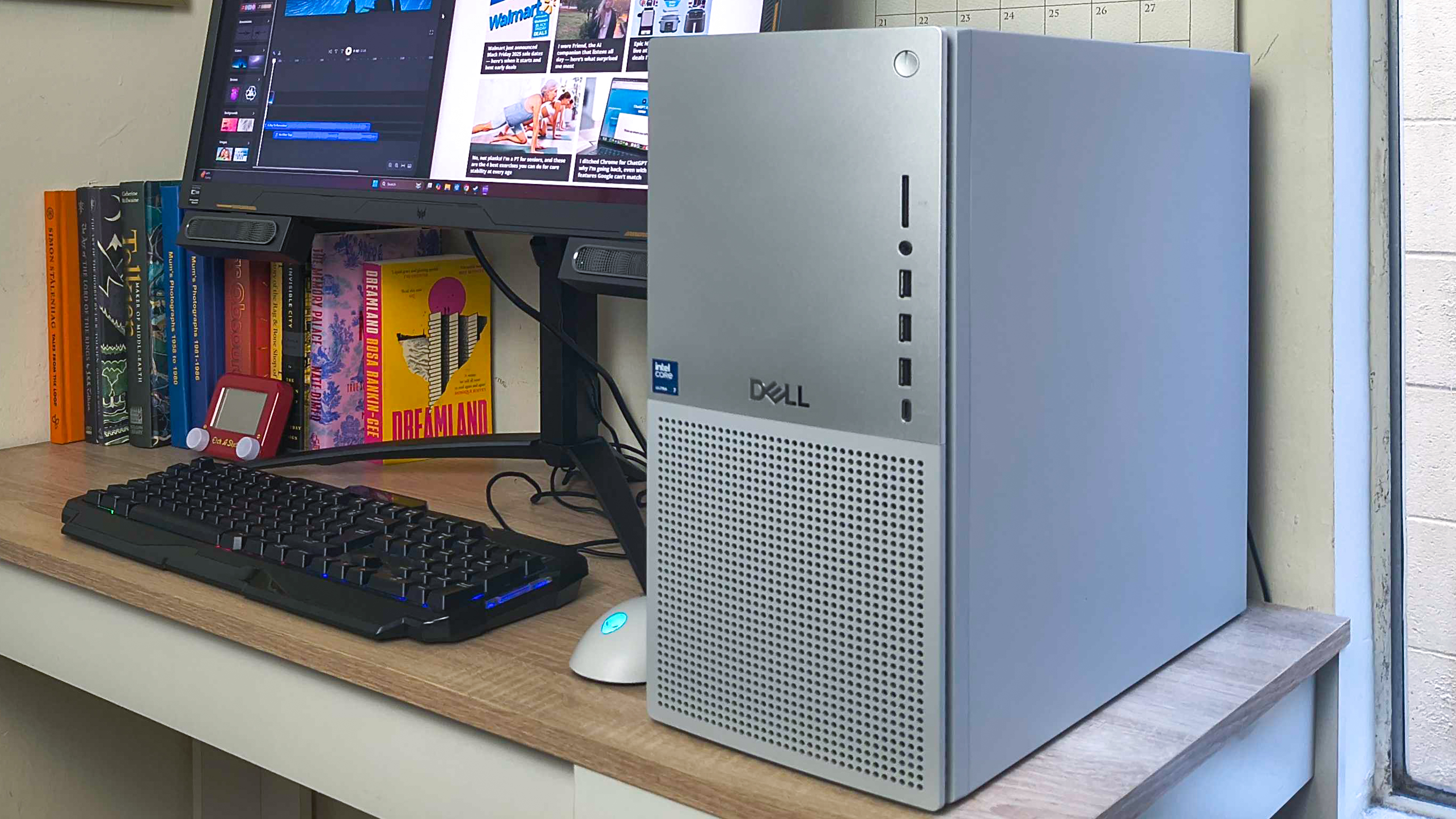
Specifications
Reasons to buy
Reasons to avoid
The Dell Tower Plus is not only highly customizable, but it’s also very affordable. Though it doesn’t look like a gaming PC, it can deliver serious performance, depending on how you configure it.
Some might not appreciate its conservative design, but we think there’s real appeal in having a relatively modest-looking machine that packs powerful components within. We reviewed our Dell Tower Plus like a gaming PC because of how it was configured. This desktop is still versatile, however, with prices ranging from $999 to $3,000-plus. It can fill a wide range of roles.
Though you can configure this PC with beefy specs, keep in mind that it tops out at an Nvidia GeForce RTX 5080 GPU. For some, that’s more than enough to play most games at 4K resolution and at high frame rates (especially with DLSS enabled). However, if you want a machine that can house an RTX 5090, you might want to look elsewhere.
The most appealing part of the Dell Tower Plus is that it can be inexpensive, which is a virtue nowadays as RAM prices continue to skyrocket. Because of that, you can forgive the unassuming looks, given how you won’t be charged an arm and a leg (unless you want to be).
As we said in our review, the Dell Tower Plus is the Millennium Falcon of gaming PCs. It might not look like much, but the Dell Tower Plus has got it where it counts.
Read our full Dell Tower Plus review.
The best value gaming PC
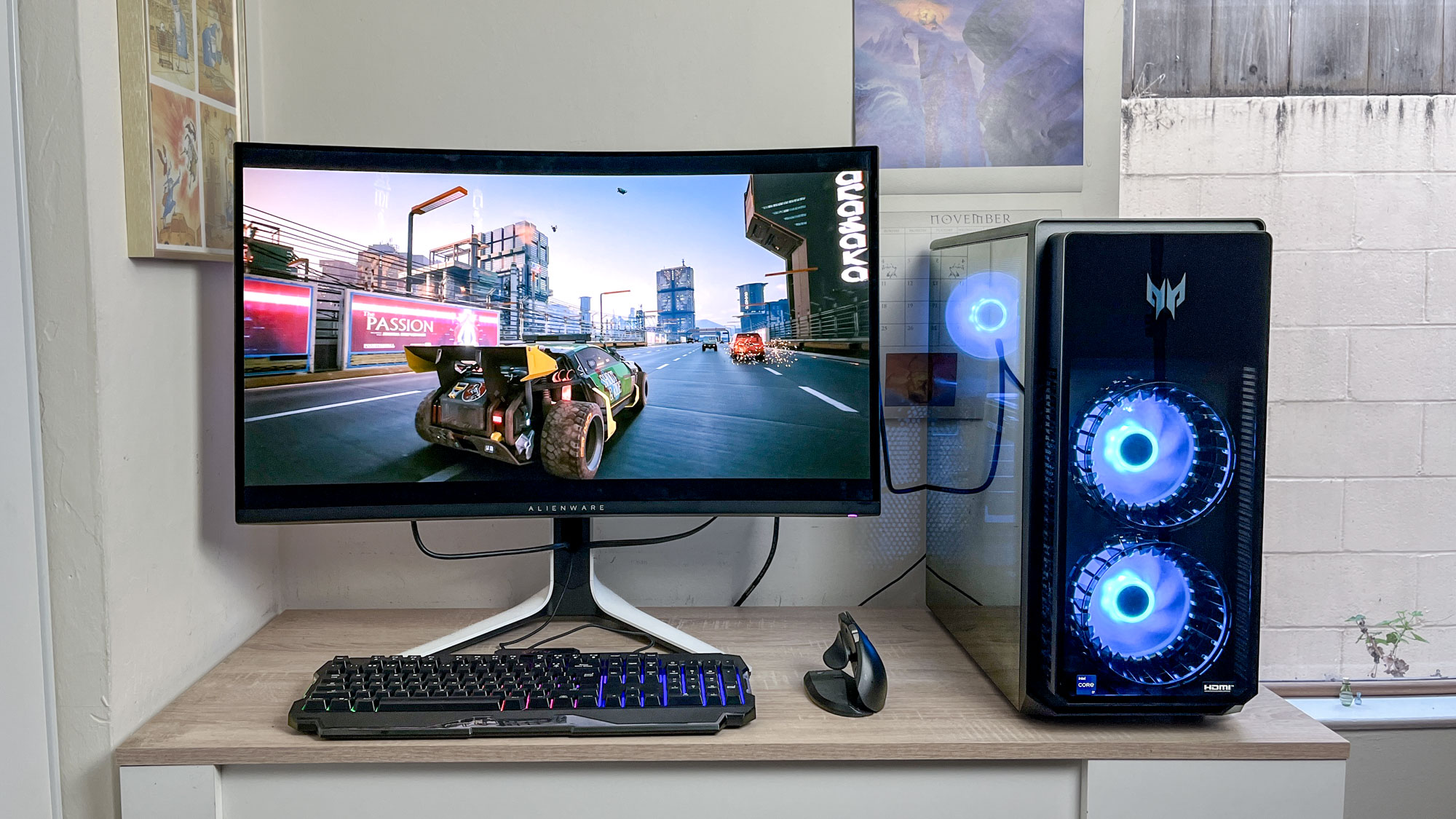
3. Acer Predator Orion 5000
Our expert review:
Specifications
Reasons to buy
Reasons to avoid
If you're looking for a gaming PC that delivers good performance at a great value, the Acer Predator 5000 is a great choice because, with a few clicks, you can get a machine that plays most games well at 1080p and up to 4K for a reasonable price.
The exact amount you'll pay will vary based on how you configure it, of course, and there are good power options available for this mid-size tower PC. Our review unit arrived sporting an Intel Core i7-14700F CPU, an Nvidia GeForce RTX 4070 Super GPU and 32GB of RAM, which is enough muscle to play PC games like Baldur's Gate 3 and Total War: Warhammer 3 well at 1080p or higher. You might not get amazing framerates with all the in-game settings cranked up to max, but if you play with them a bit and rely on Nvidia's DLSS tech, you can easily get great-looking games running at 60 FPS on this machine.
Our Acer Predator Orion 5000 review unit makes an audible whirring noise when the machine is under heavy load. That's probably good for heat and performance since this PC isn't water-cooled and relies on system fans studded throughout the case. However, during marathon sessions of demanding games like Alan Wake 2 and Star Wars Outlaws, we definitely noticed the hum of the fans while gaming.
Noisy fans aside, the well-organized, easy-to-open case, good performance and decent price make this a great gaming PC for those seeking a great value for performance.
Read our full Acer Predator Orion 5000 review.
The best compact gaming PC
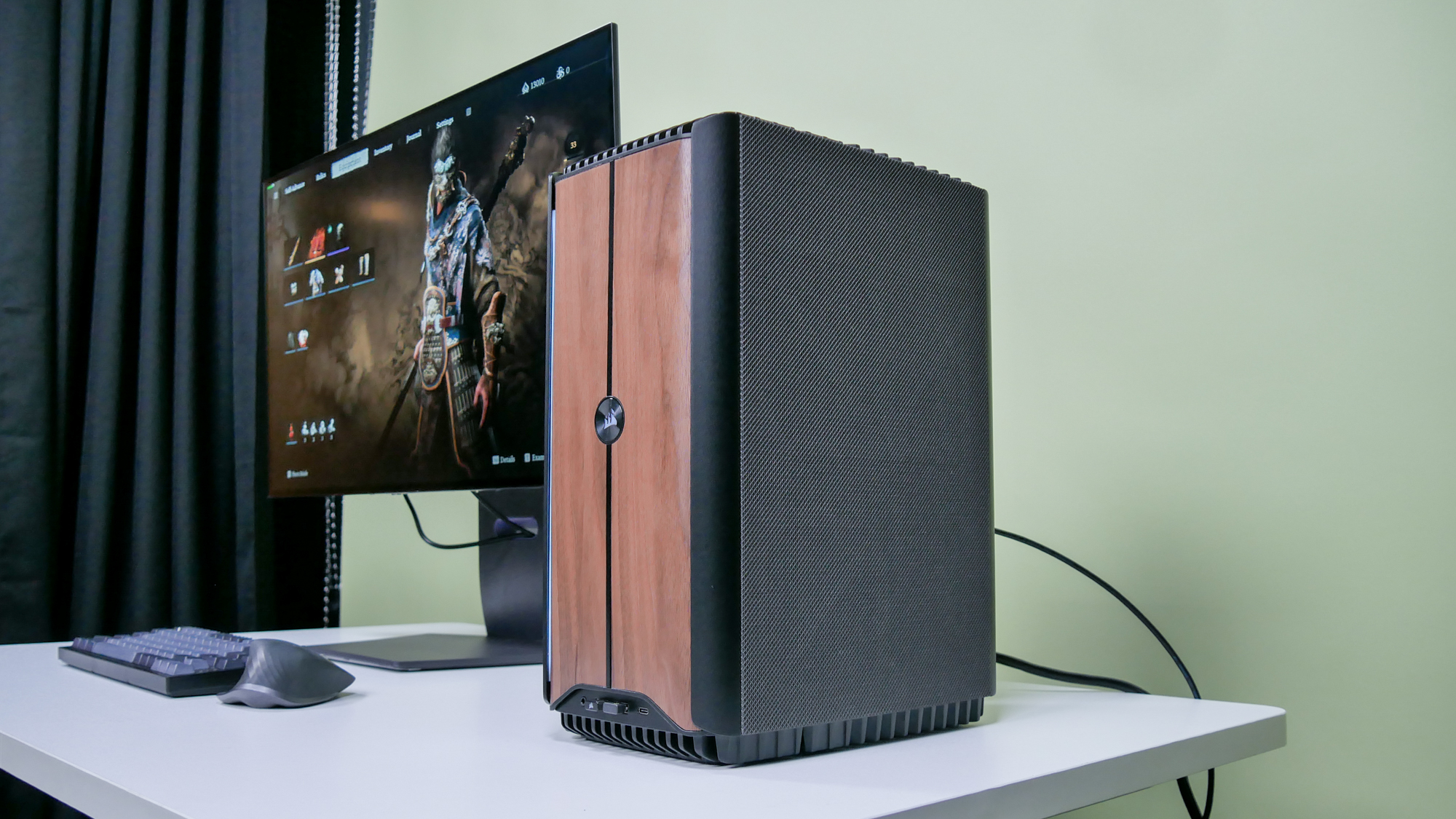
Specifications
Reasons to buy
Reasons to avoid
The Corsair One i500 might be smaller than a traditional desktop but it's no mini PC—not in size and certainly not in power. With its wood front panel and fabric sides, this doesn't look like the average gaming rig, but we can assure you it's got what it counts on the inside. This small PC delivers big gaming performance.
Thanks to its Intel Core i9-14900K CPU, Nvidia GeForce RTX 4080 Super GPU and 32GB of RAM, this miniature monster can run your favorite games at max graphical settings without breaking a sweat. And that's impressive considering how the Corsair One i500 remains cool to the touch and runs quietly even if you're playing something graphically demanding like Cyberpunk 2077.
As great as this machine is, it's not perfect. Right now, there are only two available configurations. Though the price has dropped since our review went live, you'll still have to pay a hefty amount for this rig. Also, while you can swap out its components, doing so isn't easy due to the i500's compact size. And if you want to change the GPU, you'll have to ship this desktop to Corsair so the company can do it.
The Corsair One i500 is expensive and hard to configure, but it’s one of the best gaming PCs I’ve tested. If you're looking for a powerful gaming rig that won't take up a lot of space on your desk (and looks good to boot!), then I can't recommend this one enough.
Read our full Corsair One i500 review.
The best upgradeable gaming PC
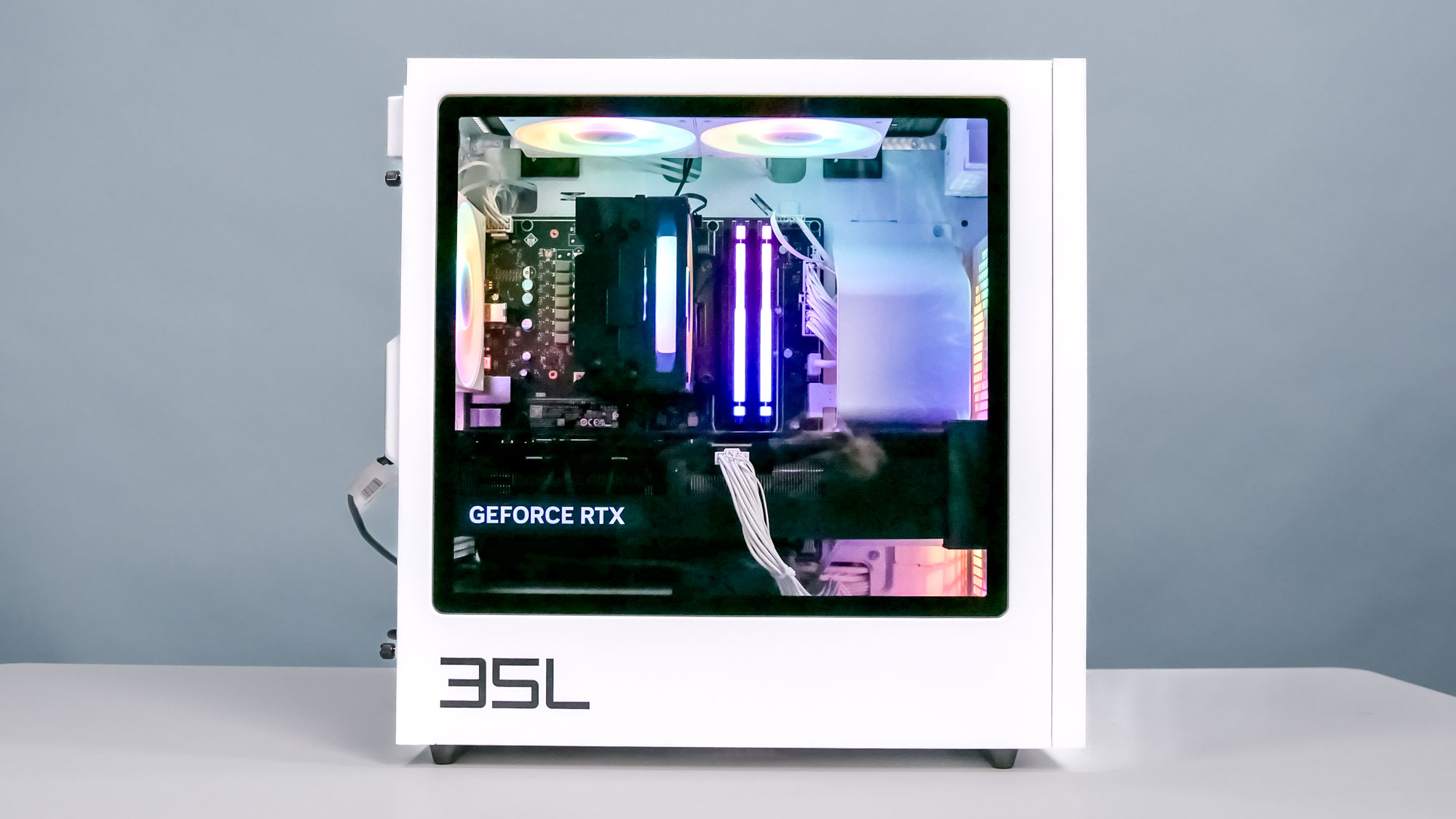
Specifications
Reasons to buy
Reasons to avoid
The HP Omen 35L isn't just stylish, it's also very upgradeable thanks to its industry-standard parts that make it easy to swap out all of its parts for those of your choosing. On top of that, this mid-tower is stylish and packs components power enough to comfortably run games at mid-to-high settings at 1440p and 60 fps (or higher).
Despite its modest size, there's a whole lot of power underneath the elegant case. Our review unit packs an AMD Ryzen 7 8700G APU, an Nvidia RTX 4080 Super GPU 32GB of RAM. Thanks to that, it can play the most graphically demanding games without breaking a sweat. And that's not just a turn of phrase since this rig remains cool to the touch and runs super quiet.
The Omen 35L might not have a wild design like other gaming PCs, but its simple boxy shape helps it better complement most gaming setups. The clear glass panel on the left side delivers a nice view of the internal components and the wonderful RGB lighting this rig produces.
While it has an odd CPU/GPU pairing and a lot of bloatware, the HP Omen 35L is a winner thanks to its low starting price, abundant configuration options, gorgeous design and easy-to-swap-out industry-standard parts.
Read our full HP Omen 35L review.
The best premium gaming PC
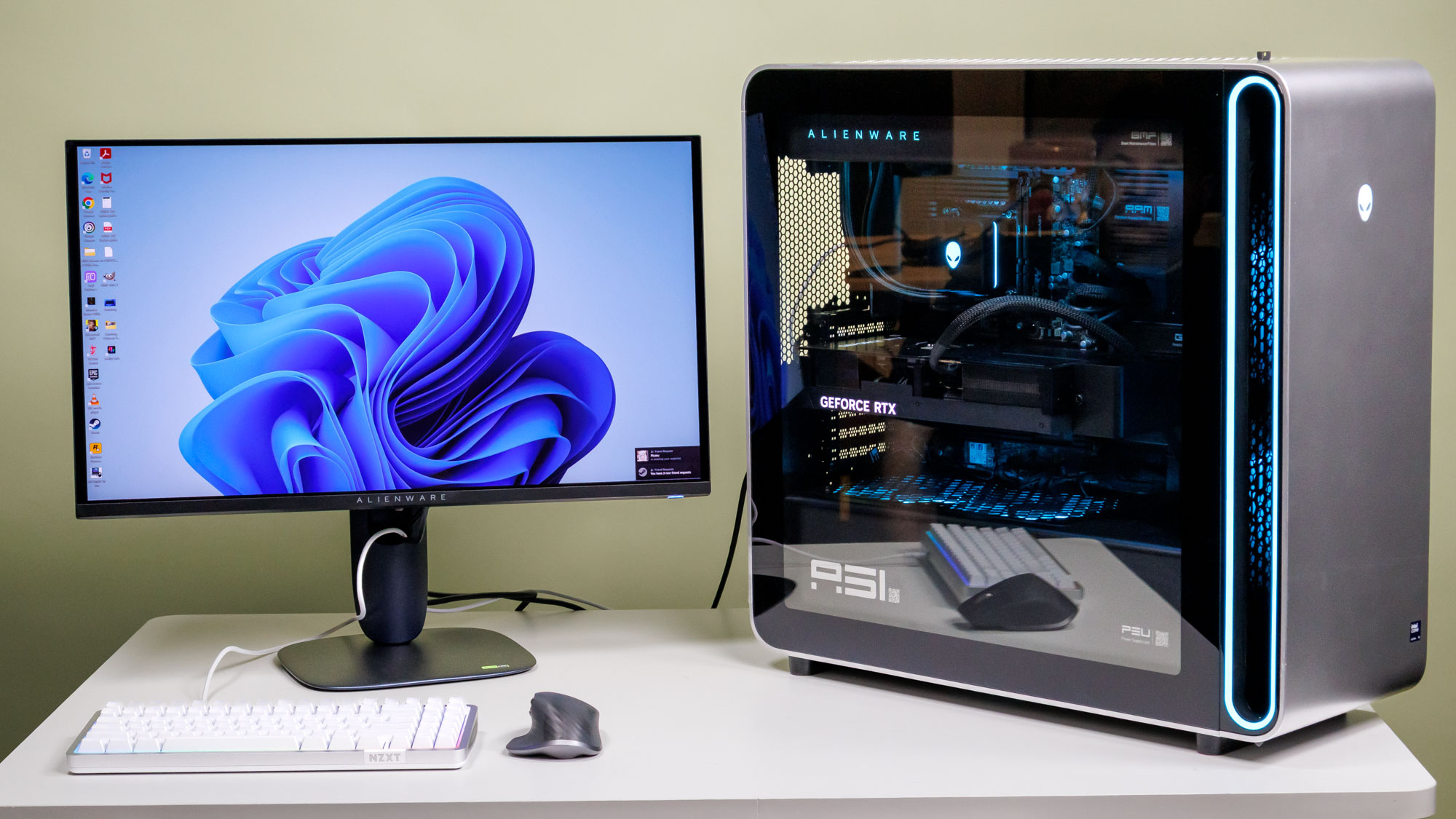
Specifications
Reasons to buy
Reasons to avoid
The Alienware Area-51 is one of the largest gaming PCs I've ever reviewed and certainly the biggest on this list. Its considerable size isn't just for sure; it serves as a housing for equally formidable internal components, all encased within a futuristic chassis. This gaming PC delivers uncompromising performance... for those who can afford it.
Our review unit packs high-end components like the powerful Nvidia GeForce RTX 5090 GPU, fast Intel Core Ultra 9 CPU and 64GB of RAM. This combination lets the system easily achieve frame rates well above 60 frames per second across a wide range of graphically demanding game titles. In addition, the innovative positive-pressure cooling system ensures that the machine maintains a low noise profile regardless of the intensity of the gaming load or other demanding tasks.
However, this level of performance comes with a steep cost. With a starting price nearing $4,000, this gaming PC isn't cheap. Beyond the cost, the Alienware Area-51's enormous size and considerable weight can make it difficult to comfortably keep in your workspace. Due to its size and weight, I advise keeping it on the floor to be safe.
Despite its considerable price tag and substantial physical footprint, the Alienware Area-51 delivers an exceptional gaming experience. Its powerful components and efficient cooling work in concert to provide smooth, high-fidelity gaming across a demanding selection of titles. Thanks to its top-tier performance and innovative design, the Alienware Area-51 has earned a place in this guide.
Read our full Alienware Area-51 review.
The best quiet gaming PC
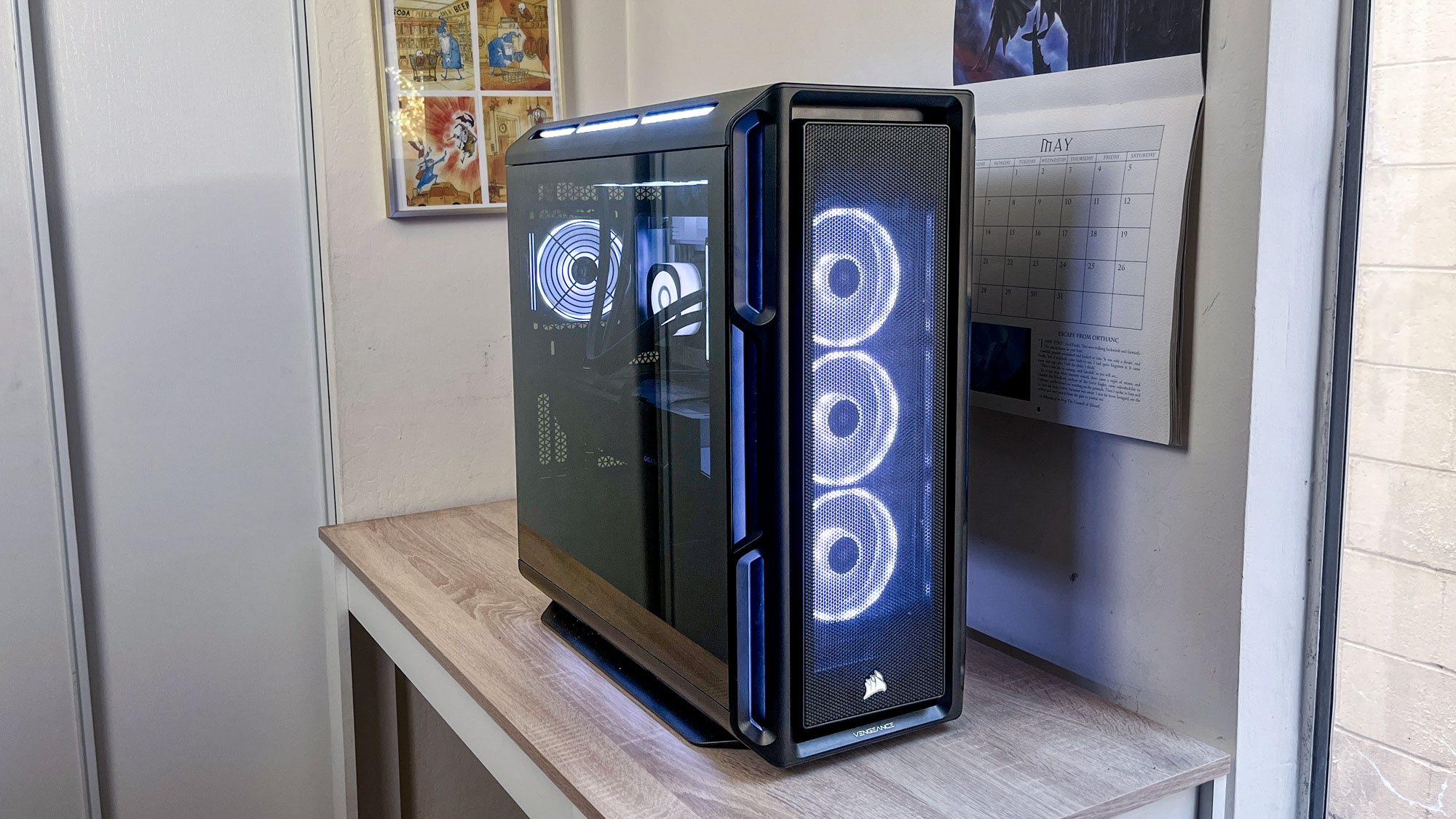
Specifications
Reasons to buy
Reasons to avoid
The Corsair Vengeance i8300 (2025) might be big and expensive, but it's got the power to justify it's lofty asking price. But what's perhaps most remarkable is how quietly it runs. Like the Alienware Area-51 desktop, Corsair's machine can handle the most graphically demanding games without its fans making excessive noise.
This monstrous rig delivers nearly flawless 60+ frames per second performance in some of the latest and most demanding PC games. This is raw performance too, without any upscaling tech like Nvidia DLSS or AMD FSR enabled. When we enabled DLSS on games like Cyberpunk, we enjoyed full path-traced lighting and incredible visual effects while framerates hovered consistently in the 70-90 FPS range.
After extensive testing, we're pleased to report that even after hours of playing Cyberpunk 2077 or Doom with all settings cranked to max, the PC's fans never made more than a low hum. While there definitely is some fan noise, especially when sustaining peak performance, it's quiet enough that you barely notice the sound.
Unfortunately, this gaming PC is a hefty beast that's hard to move. That's due to its over 30-pound weight and because its case is roughly two feet tall. This PC is so heavy that it's actually best to leave it on the floor, as a standard desk might not be capable of handling its weight.
While you'll arguably get a better deal out of the Alienware Area-51 since it delivers better performance for thousands less, the latest iteration of the Corsair Vengeance i8300 delivers a phenomenal and quiet gaming experience. It's one of the best gaming PCs we've tested so far.
Read our full Corsair Vengeance i8300 review.
The best mini gaming PC
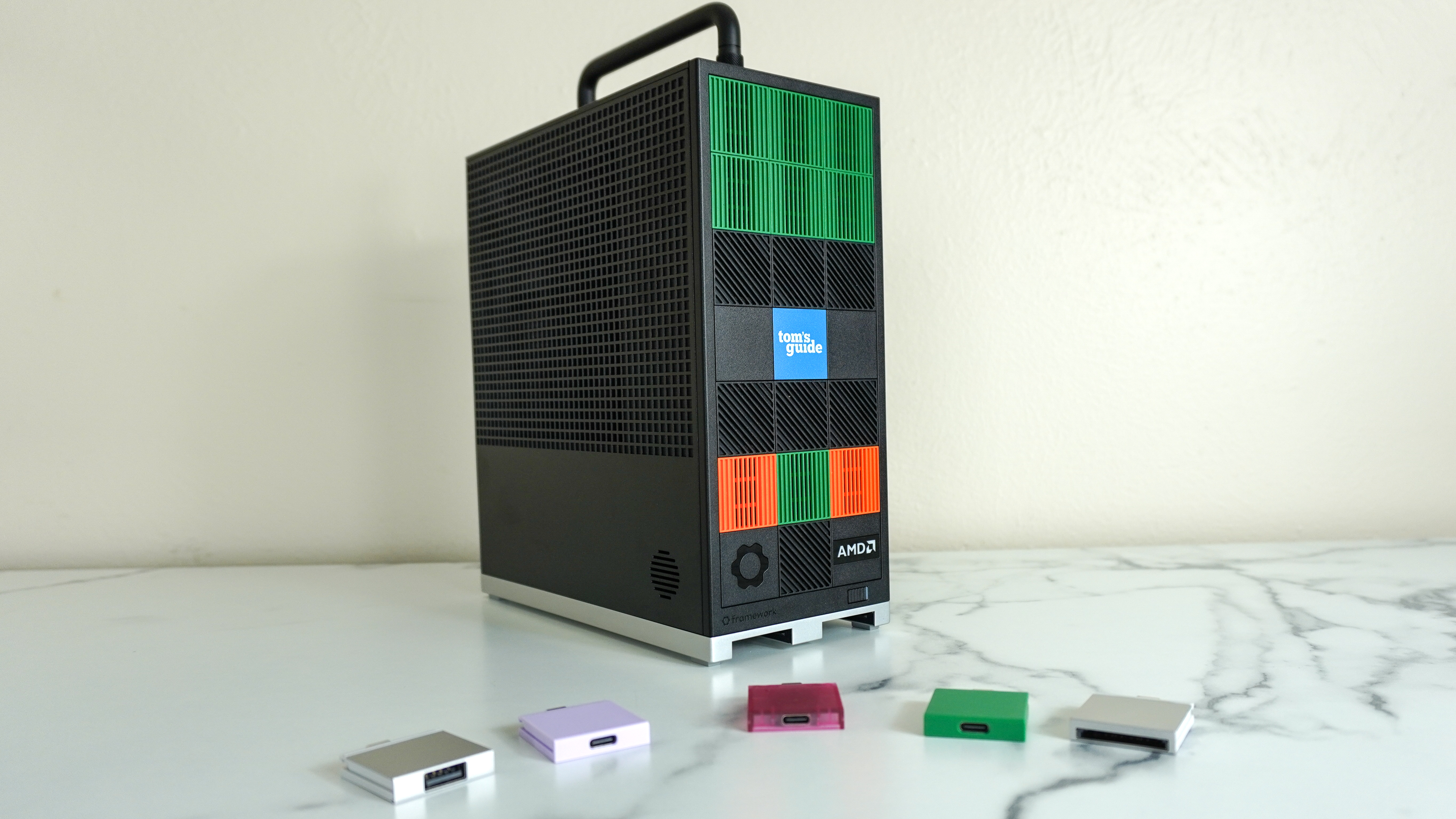
Specifications
Reasons to buy
Reasons to avoid
The Framework Desktop is a powerful, highly adaptable mini PC that’s a great fit for work, gaming, and local AI processing. Like the company's laptops, this machine stays true to the core Framework philosophy — offering a value proposition that goes way beyond your typical mini PC.
Customization and repairability are the stars of the show here. Just like a Framework laptop, this desktop features easily replaceable components that make maintenance and upgrades a breeze. Its modularity is even better thanks to the Expansion Cards for your front ports, and you can even personalize the look with swappable magnetic front panel tiles.
There is a bit of a catch, though. Because of how these chips are designed, the AMD Ryzen AI Max processor and the soldered LPDDR5x memory aren't replaceable. However, you can still tailor the system to your needs by choosing between three different CPU and memory configurations. Plus, you can buy your storage and OS during checkout or bring your own to keep costs down.
As we noted in our review, the Framework Desktop could be a major step forward for both mini PCs and small form factor desktops in general. While only time will tell for sure, it’s already cemented its place as one of the best mini PCs you can buy right now.
Read our full Framework Desktop review.
The best customizable gaming PC
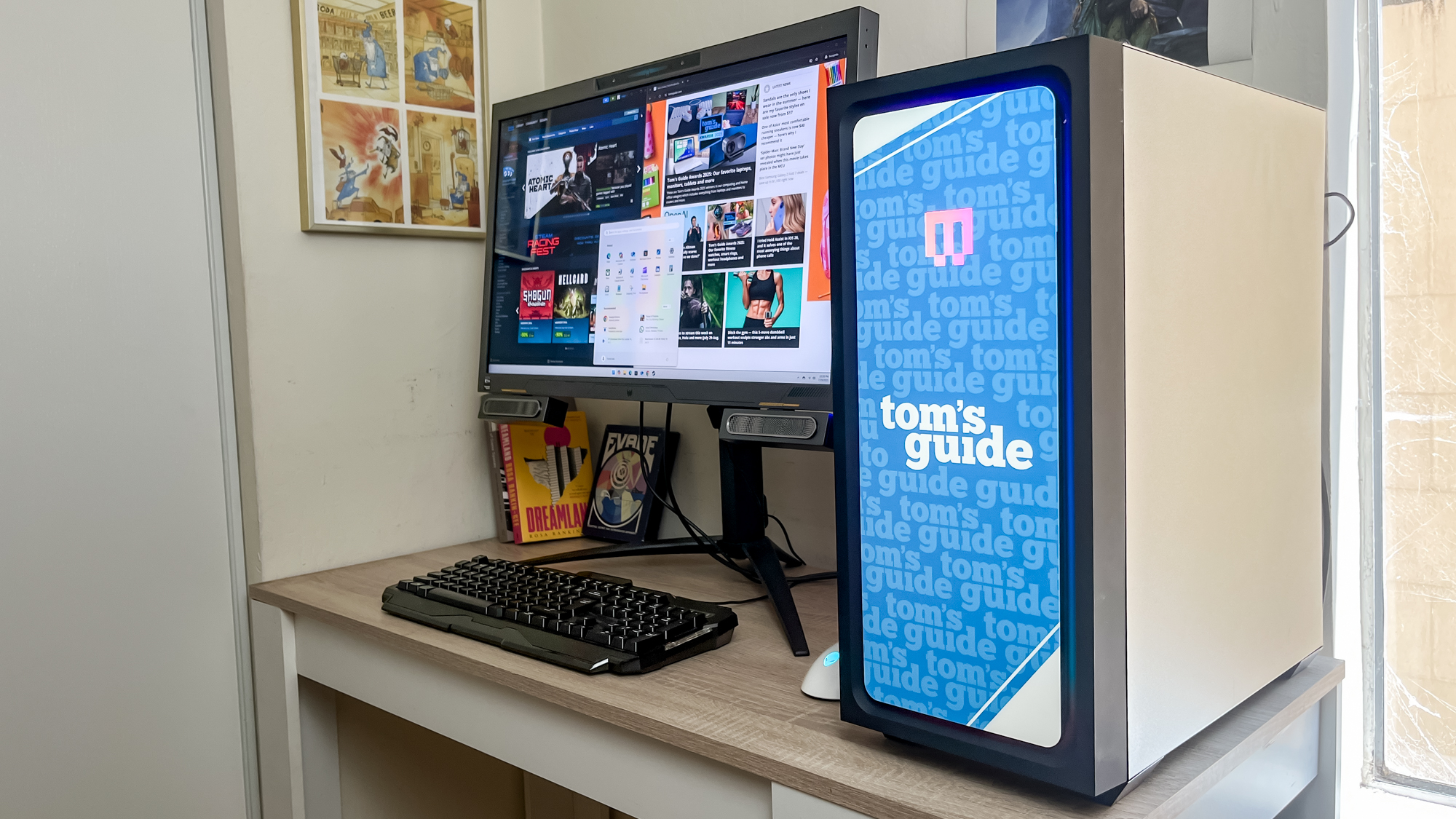
Specifications
Reasons to buy
Reasons to avoid
The Maingear MG-1 is one of the company's most affordable, customizable gaming PCs, at least to start.
One of the big selling points of the MG-1 is its swappable front panels, and we love how they remind us of the old Xbox 360 faceplate days. Even before you plug it in and see how well it performs, you'll be charmed by the (fairly) portable mid-size case and that eye-catching custom panel on the front.
But if looks were the most exciting aspect of this gaming PC, we'd quickly lose interest. It's what's inside that counts, and this PC can be outfitted with the latest Intel or AMD CPU, an RTX 50-series GPU, and enough RAM and storage to deliver a smooth gaming experience.
Like most great gaming PCs, it can get pretty expensive when kitted with higher-end components. But if you can afford it, you're getting a potent powerhouse that's easy to customize, easy to move, and so quiet you'd barely know it was running, even after gaming for hours. And as we said, that swappable faceplate is just too cool.
Read our full Maingear MG-1 Ultimate review.
Also tested
We test and review many gaming PCs every year, and just because they don't all make this list doesn't mean they aren't good machines.
Below we've gathered all the great gaming PCs we've tested which don't quite make this list, but are still good alternatives well worth considering if they meet your unique needs, or if you can't find your first choice on sale.
This updated MSI Codex R2 gaming PC is a good value that delivers affordable 1080p gaming performance thanks to its 14th Gen Intel CPU and Nvidia 40-series GPU. Wi-Fi 7 support is also nice to have and the case is easy to open, making this a good starter PC for new PC gamers.
The best gaming PCs compared
Here is a quick look at our testing data for the gaming PCs on this list. The tables below show you how well they run games and their overall performance. The latter is important since a good gaming PC is also great at other tasks like video editing and rendering.
| Header Cell - Column 0 | Grand Theft Auto V | Borderlands 3 |
|---|---|---|
Alienware Aurora R15 | 186 | 257 |
Dell Tower Plus (2025) | 182 | 174 |
Acer Predator Orion 500 | 169 | 174 |
Corsair One i500 | 186 | 240 |
HP Omen 35L | 159 | 189 |
Alienware Area-51 | 185 | 250 |
Asus ROG NUC 970 | 97 | 104 |
| Header Cell - Column 0 | Geekbench 6 (multi-core) | 25 GB File Copy (MBps) | Handbrake (Min:Seconds) |
|---|---|---|---|
Alienware Aurora R15 | 22,494 | 1,340 | 2:17 |
Dell Tower Plus | 19,181 | 1,633 | 2:01 |
Acer Predator Orion 5000 | 16,534 | 1585 | 2:34 |
Corsair One i500 | 21,560 | 2,095 | 2:04 |
HP Omen 35L | 13,559 | 1,956 | 4:03 |
Alienware Area-51 | 21,786 | 1,898 | 1:53 |
Asus ROG NUC 970 | 13,514 | 1.686 | 3:40 |
How to choose the best gaming PC
Price: It can be tricky shopping for a good "cheap" gaming PC since the best systems also tend to cost the most. Nowadays, decent PCs can start at over $1,000 and that's usually during a sale. If you want to keep costs as low as possible, look for rigs with at least a 12th-generation Intel Core i5 CPU, an Nvidia GeForce RTX 3050 GPU and 16GB of RAM.
Performance: You'll also need to think about the kind of gaming experience you want. The aforementioned specs should allow you to play most games at medium setting and 60fps so long as you keep the resolution to 1080p. However, if you want to play at 4K and higher resolutions, you'll need a beefier rig with hardware like a 13th (or 14th) Gen Intel Core i7 or i9 CPU, an RTX 3080 Ti (or 3090) or an RTX 40-series GPU starting with the RTX 4070. You'll also want 32GB of RAM to really get things cranking.
Upgradability: Gaming PC components are always evolving, and the best gaming PCs can be easily upgraded with new parts over time. Machines such as the Alienware Aurora are easy to open up and tinker with, even for the less tech-savvy. Compact machines, such as the Corsair One, can be a bit harder to open up. So if you plan on upgrading your investment over time, keep this in mind.
How we test the best gaming PCs
In our search to find the best gaming PC, we run every model we review through a standardized gauntlet of real-world and benchmark tests, in order to measure how each desktop stacks up as both a gaming machine and as an everyday computer.
As far as hard numbers go, we currently run the framerate benchmark utilities for Shadow of the Tomb Raider, Far Cry 6, Red Dead Redemption 2 and Grand Theft Auto V at 1920 x 1080 with graphics maxed out, as well as at 2560 x 1440 and 4K if a system allows for it. On top of that, we play tons of graphics-intensive games like Cyberpunk 2077 to give you a sense of how these gaming desktops hold up anecdotally.
In terms of synthetic tests, we run a gamut of benchmarks that include PCMark 10 (for graphics) and Geekbench 6 (for CPU performance). To test a system's hard drive, we measure how fast each PC can copy 4.97GB worth of multimedia files.
For more information, check out our how we test page for Tom's Guide.

Tony is a Senior Staff Writer at Tom’s Guide covering everything computing. Though growing up as a console gamer, Tony has been passionate about gaming rigs for over ten years because they deliver the best possible graphics and performance. And since gaming rigs are so powerful, Tony also likes them as productivity machines. If it has an RTX graphics card, Tony is going to take notice.
Get instant access to breaking news, the hottest reviews, great deals and helpful tips.

Tony is a computing writer at Tom’s Guide covering laptops, tablets, Windows, and iOS. During his off-hours, Tony enjoys reading comic books, playing video games, reading speculative fiction novels, and spending too much time on X/Twitter. His non-nerdy pursuits involve attending Hard Rock/Heavy Metal concerts and going to NYC bars with friends and colleagues. His work has appeared in publications such as Laptop Mag, PC Mag, and various independent gaming sites.
- Alex WawroSenior Editor Computing
 Club Benefits
Club Benefits










